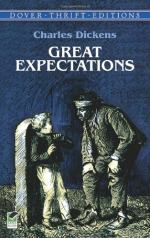It may have been about a month after my sister’s reappearance in the kitchen, when Biddy came to us with a small speckled box containing the whole of her worldly effects, and became a blessing to the household. Above all, she was a blessing to Joe, for the dear old fellow was sadly cut up by the constant contemplation of the wreck of his wife, and had been accustomed, while attending on her of an evening, to turn to me every now and then and say, with his blue eyes moistened, “Such a fine figure of a woman as she once were, Pip!” Biddy instantly taking the cleverest charge of her as though she had studied her from infancy, Joe became able in some sort to appreciate the greater quiet of his life, and to get down to the Jolly Bargemen now and then for a change that did him good. It was characteristic of the police people that they had all more or less suspected poor Joe (though he never knew it), and that they had to a man concurred in regarding him as one of the deepest spirits they had ever encountered.
Biddy’s first triumph in her new office, was to solve a difficulty that had completely vanquished me. I had tried hard at it, but had made nothing of it. Thus it was:
Again and again and again, my sister had traced upon the slate, a character that looked like a curious T, and then with the utmost eagerness had called our attention to it as something she particularly wanted. I had in vain tried everything producible that began with a T, from tar to toast and tub. At length it had come into my head that the sign looked like a hammer, and on my lustily calling that word in my sister’s ear, she had begun to hammer on the table and had expressed a qualified assent. Thereupon, I had brought in all our hammers, one after another, but without avail. Then I bethought me of a crutch, the shape being much the same, and I borrowed one in the village, and displayed it to my sister with considerable confidence. But she shook her head to that extent when she was shown it, that we were terrified lest in her weak and shattered state she should dislocate her neck.
When my sister found that Biddy was very quick to understand her, this mysterious sign reappeared on the slate. Biddy looked thoughtfully at it, heard my explanation, looked thoughtfully at my sister, looked thoughtfully at Joe (who was always represented on the slate by his initial letter), and ran into the forge, followed by Joe and me.
“Why, of course!” cried Biddy, with an exultant face. “Don’t you see? It’s him!”
Orlick, without a doubt! She had lost his name, and could only signify him by his hammer. We told him why we wanted him to come into the kitchen, and he slowly laid down his hammer, wiped his brow with his arm, took another wipe at it with his apron, and came slouching out, with a curious loose vagabond bend in the knees that strongly distinguished him.




